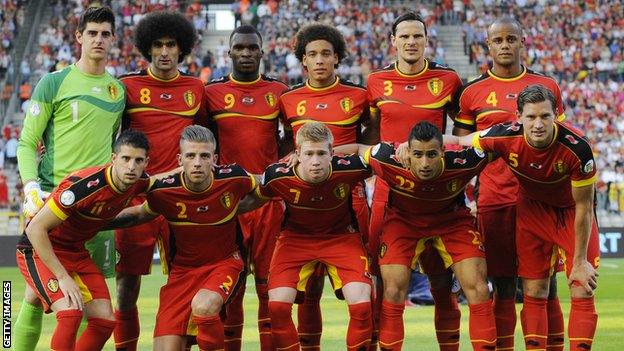World Cup 2014: Guide to Colombia's Group C
- Published
COLOMBIA (seeded)
How do they play?
Style & formation: After years of underachievement whilst employing defensive tactics, Colombia have reaped the benefits of attack-minded variations of 4-4-2 and 4-2-2-2.
Playmaker James Rodriguez roams inside, retreating to the left when out of possession, while the full-backs surge forward to provide width, often leaving just one genuine holding midfielder covering.
It's thrilling when it works but leaves them vulnerable to counter-attacks.
Strengths: The squad has plenty of attacking talents in fine form. Jackson Martinez hit 29 goals for Porto this term, while Carlos Bacca scored 21 for Sevilla. Huge numbers of fans will travel to cheer on the team and their itinerary involves relatively short flights from their Sao Paulo base.
Moreover, hot conditions won't bother them - they played qualifiers in the sweltering Caribbean port of Barranquilla, opting for mid-afternoon kick-offs in the belief their rivals would wilt in the heat.
Weaknesses: The absence of the iconic Falcao - a supreme predator with 20 goals in 51 caps and 155 goals in 198 club games since arriving in Europe.
Key centre-back Luis Perea is also ruled out so there are big question marks over the back four. Captain Mario Yepes, 38, is cripplingly slow, while Cristian Zapata and Pablo Armero have lost their places at club level and Juan Zuniga has barely played due to injury.
Key player
With Falcao not fit, the burden of expectation falls on Monaco team-mate James Rodriguez, an elegant number 10 who created more chances (43) than any other player in South American qualifying. The gifted left footer, who cost Monaco £37.5m last summer, topped the Ligue 1 charts for assists (12) this season. Shut him down and Colombia may struggle.
One to watch
Juan Cuadrado has blossomed at Fiorentina and was Serie A's best winger this term, with his explosive pace and ferocious shot yielding 15 goals. His passing accuracy (89.1%) was the highest of any regular Colombian player in World Cup qualifying.
The boss
Carlos Valderrama says Jose Pekerman, the Cafeteros' first foreign coach for over 30 years, has given Colombian football its identity back by reverting to an attacking philosophy.
The Argentine replaced Leonel Alvarez after Colombia made a stuttering start to qualifying for Brazil. He led his native country to the last eight of the 2006 World Cup.
How they qualified
Fairly comfortably, finishing a close second to Argentina. Their haul of 30 points from 16 games represents their best ever return. Outstanding performances included a 4-0 win at home to Uruguay and a 3-1 win in Chile, plus a gritty goalless draw in Argentina.
World Cup record
In four campaigns they've reached the last 16 only once, losing to Cameroon in 1990.
Painful memories still linger from USA 94; defender Andres Escobar was murdered in his hometown of Medellin after scoring a crucial own goal at the tournament.
Fifa ranking: 8
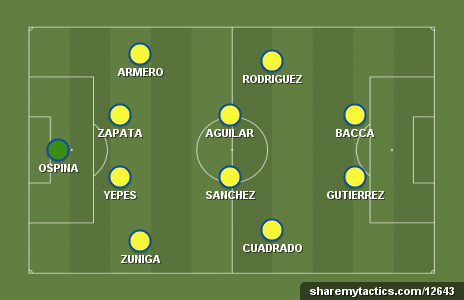
Possible starting XI
Squad
Goalkeepers: David Ospina (Nice), Faryd Mondragon (Deportivo Cali), Camilo Vargas (Independiente Santa Fe).
Defenders: Mario Yepes (AC Milan), Cristian Zapata (AC Milan), Pablo Armero (West Ham, on loan from Napoli), Camilo Zuniga (Napoli), Santiago Arias (PSV Eindhoven), Eder Alvarez Balanta (River Plate), Carlos Valdes (San Lorenzo).
Midfielders: Fredy Guarin (Inter Milan), Juan Cuadrado (Fiorentina), James Rodriguez (Monaco), Abel Aguilar (Toulouse), Juan Fernando Quintero (Porto), Carlos Sanchez (Elche), Carlos Carbonero (River Plate), Alexander Mejia (Atletico Nacional),
Forwards: Victor Ibarbo (Cagliari), Jackson Martinez (Porto), Carlos Bacca (Sevilla), Adrian Ramos (Hertha Berlin), Teofilo Gutierrez (River Plate).
IVORY COAST
Prospects
The Ivorians' golden generation may have a grey-ish tinge but a kind draw (for once) has given them a golden chance of reaching the last 16 for the first time. But while their attacking options are formidable, the back line doesn't inspire confidence. This Ivorian team has flattered to deceive, with their failure to win at least one Africa Cup of Nations mystifying. They must avoid another early exit to shed their "chokers" tag.
Key player
Manchester City powerhouse Yaya Toure scored four times in six qualifiers, a tally bettered only by Lille forward Salomon Kalou.
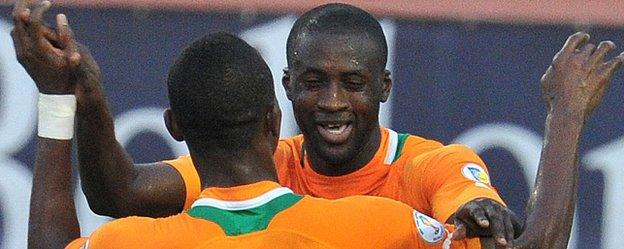
Yaya Toure and Kalou were the Ivorians' top scorers in qualifying
The boss
The appointment of Sabri Lamouchi in May 2012 was hugely controversial. A France international who played at Euro 1996, he had no previous coaching experience. He dropped Didier Drogba after a disappointing 2013 Africa Cup of Nations, but recalled the veteran striker last August.
How they qualified
Along with Nigeria, they were the only African side to end unbeaten. They easily topped their preliminary group ahead of Morocco before winning a play-off against Senegal 4-2 on aggregate. There were some nervy moments when they trailed 1-0 in the second leg in Casablanca, but Salomon Kalou's injury-time equaliser booked their place in Brazil.
World Cup record
They were drawn in the "Group of Death" in their two previous tournaments. On both occasions they ended third, trailing Argentina and the Netherlands in 2006 and Brazil and Portugal in 2010.
Fifa ranking: 23 (joint)
Squad
Goalkeepers: Boubacar Barry (Lokeren), Sylvain Gbohouo (Sewe Sport), Sayouba Sande (Stabaek).
Defenders: Kolo Toure (Liverpool), Sol Bamba (Trabzonspor), Didier Zokora (Trabzonspor), Serge Aurier (Toulouse), Arthur Boka (Stuttgart), Ousmane Viera Diarrassouba (Caykur Rizespor), Constant Djakpa (Frankfurt), Jean-Daniel Akpa-Akpro (Toulouse).
Midfielders: Yaya Toure (Manchester City), Cheick Tiote (Newcastle), Serey Die (Basel), Max Gradel (Saint Etienne), Diomande Ismael (Saint Etienne), Didier Ya Konan (Hannover), Mathis Bolly (Dusseldorf).
Forwards: Gervinho (Roma), Didier Drogba (Galatasaray), Salomon Kalou (Lille), Wilfried Bony (Swansea), Giovanni Sio (Basel).
GREECE
Prospects
Despite their lofty Fifa ranking of 12th, the bookies rate Greece as outsiders to progress from Group C and the weakest European side in Brazil. Shock winners of Euro 2004, you can get odds of over 300/1 on Greece lightning striking twice this summer. There is a chronic lack of midfield creativity and little goal threat up front - especially if Kostas Mitroglou isn't fit and firing. But boss Fernando Santos knows how to get the most out of his limited resources and the Greeks' team spirit is second to none.
Key player
Greece's hopes of advancing beyond the group stage for the first time may depend on which Kostas Mitroglou we see in Brazil - the deadly "Mitrogoal" who hit 23 goals in 23 games for Olympiakos and Greece prior to the turn of the year, or the injury-cursed flop who made just three appearances for Fulham in 2014.
The boss
Portuguese coach Fernando Santos took over in 2010, but admits the legacy of predecessor Otto Rehhagel, under whom Greece won Euro 2004, remains "an identity that is not easy to change. We've tried to play a different way [but] then we slipped back into our comfort zone, our defensive strength". He will leave his post after Brazil.
How they qualified
Greece finished as runners-up to Bosnia-Hercegovina in Group G but were seeded for the play-offs, and beat Romania 4-2 on aggregate, thanks largely to Mitroglou.
World Cup record
Their two previous campaigns (1994 and 2010) ended at the group stage.
They did at least claim their first victory in South Africa, beating Nigeria, but bowed out following defeat by Argentina in Rehhagel's final game in charge.
Fifa ranking: 12
Squad
Goalkeepers: Orestis Karnezis (Granada), Panagiotis Glykos (PAOK), Stefanos Kapino (Panathinaikos).
Defenders: Kostas Manolas, Giannis Maniatis, Jose Holebas (all Olympiakos), Sokratis Papastathopoulos (Borussia Dortmund), Giorgios Tzavellas (PAOK), Loukas Vyntra (Levante), Vasilis Torosidis (Roma), Vangelis Moras (Verona).
Midfielders: Alexandros Tziolis (Kayserispor), Andreas Samaris (Olympiakos), Kostas Katsouranis (PAOK), Giorgos Karagounis (Fulham), Panagiotis Tachtsidis (Torino), Ioannis Fetfatzidis (Genoa), Lazaros Christodoulopoulos (Bologna), Panagiotis Kone (Bologna).
Forwards: Dimitris Salpingidis (PAOK), Giorgios Samaras (Celtic), Konstantinos Mitroglou (Fulham), Theofanis Gekas (Konyaspor).
JAPAN
World Cup team profile: Japan
Prospects
The Asian champions have the technical ability to out-pass all of their Group C opponents but their Achilles heel remains a lack of striking options, meaning goals usually come from midfield. They will learn from last year's chastening Confederations Cup campaign, when they ran out of steam late in matches, exposing defensive weaknesses. But November's draw in the Netherlands and a win in Belgium have revived hopes that Japan could yet be a surprise package.
Key player
Keisuke Honda, 27, revels in his central, attacking role for the Blue Samurai. But he has looked out of sorts since a January move to AC Milan, where he's been mainly deployed on the right wing. Like Manchester United's Shinji Kagawa, he will hope to leave his poor club form behind in Brazil.
The boss
Alberto Zaccheroni is Japan's sixth foreign head coach. The Italian went unbeaten in his first 16 games, including victory at the 2011 Asia Cup. His honeymoon ended with the Confederations Cup disappointment and poor performances in friendlies but results have improved recently. He led AC Milan to the Serie A title in 1999.
How they qualified
Japan were the first country to qualify for the 2014 finals, doing so in early June 2013. They achieved the most points (17) and top scored (16 goals) in Asia's final qualifying group stage.
World Cup record
Japan made their debut in 1998 and will be appearing at their fifth straight World Cup finals. They have twice reached the last 16, first doing so on home soil in 2002 when beaten by eventual third-placed team Turkey.
Fifa ranking: 46
Squad
Goalkeepers: Eiji Kawashima (Standard Liege), Shusaku Nishikawa (Urawa Reds), Shuichi Gonda (FC Tokyo).
Defenders: Masato Morishige (FC Tokyo), Yasuyuki Konno (Gamba Osaka), Yuto Nagatomo (Inter Milan), Maya Yoshida (Southampton), Masahiko Inoha (Jubilo Iwata), Atsuto Uchida (Schalke 04), Hiroki Sakai (Hannover 96), Gotoku Sakai (VfB Stuttgart).
Midfielders: Yasuhito Endo (Gamba Osaka), Keisuke Honda (AC Milan), Shinji Kagawa (Manchester United), Makoto Hasebe (FC Nuremberg), Hiroshi Kiyotake (FC Nuremberg), Hotaru Yamaguchi (Cerezo Osaka), Toshihiro Aoyama (Sanfrecce Hiroshima), Manabu Saito (Yokohama F Marinos).
Forwards: Shinji Okazaki (Mainz), Yoichiro Kakitani (Cerezo Osaka), Yuya Osako (TSV Munich 1860), Yoshito Okubo (Kawasaki Frontale).
Fixtures
14 June 2014
Colombia v Greece, Estadio Mineirao, Belo Horizonte, 17:00 (BBC)
15 June 2014
Ivory Coast v Japan, Arena Pernambuco, Recife, 02:00 (ITV)
19 June 2014
Colombia v Ivory Coast, Estadio Nacional, Brasilia, 17:00 (BBC)
19 June 2014
Japan v Greece, Arena das Dunas, Natal, 23:00 (BBC)
24 June 2014
Japan v Colombia, Arena Pantanal, Cuiaba, 21:00 (BBC)
24 June 2014
Greece v Ivory Coast, Estadio Castelao, Fortaleza, 21:00 (BBC)
- Published26 May 2014
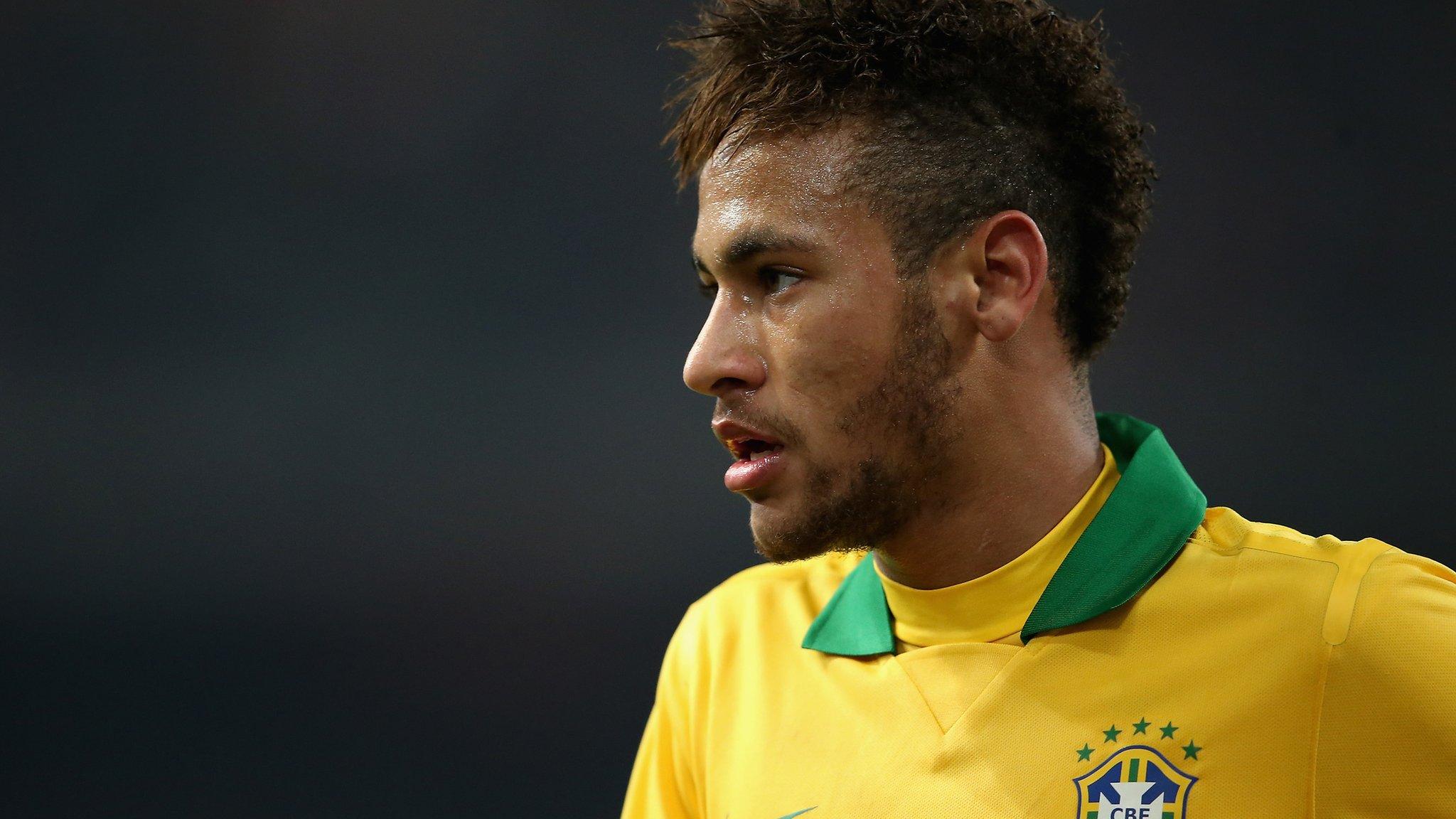
- Published23 May 2014
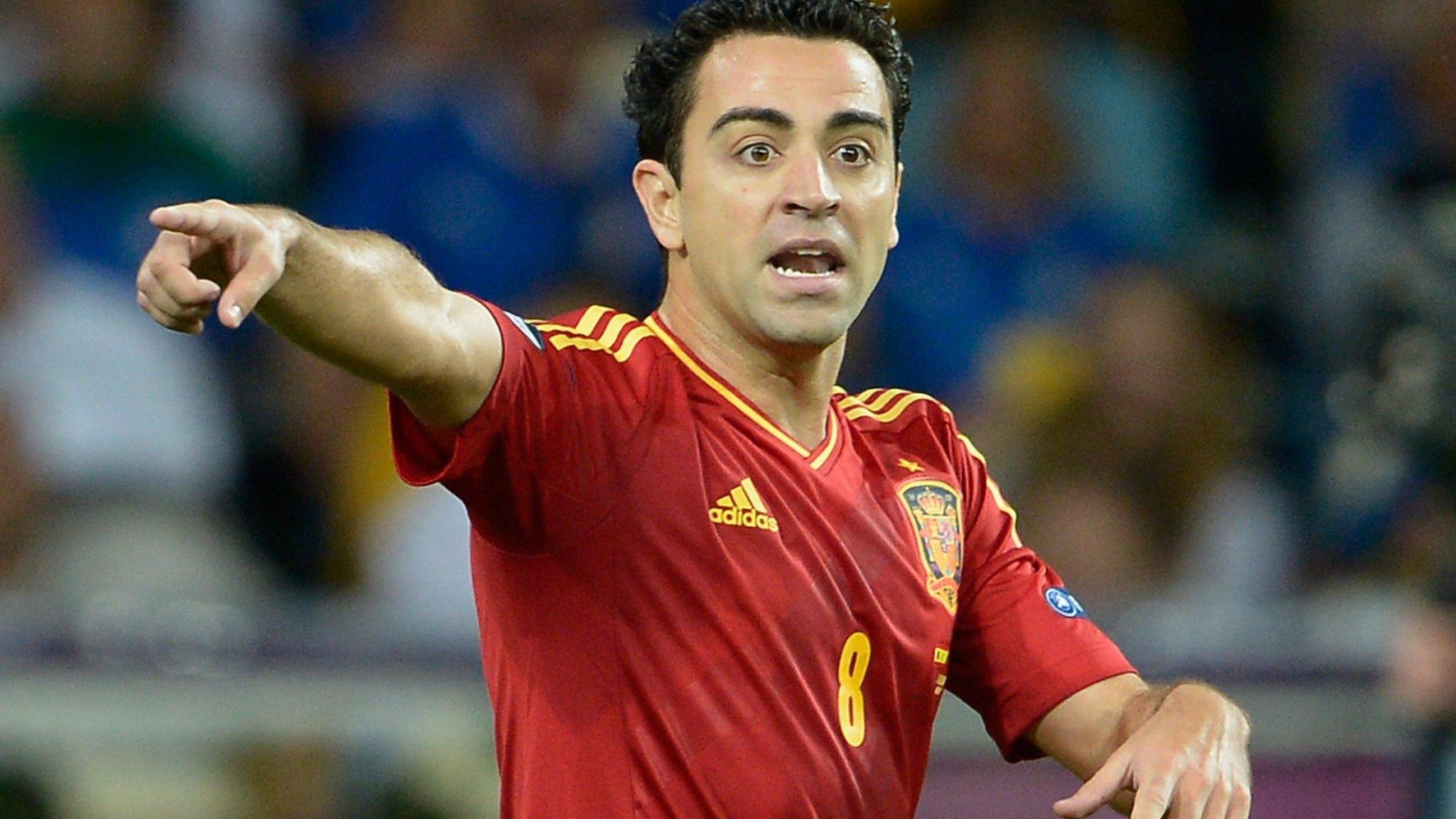
- Published30 May 2014
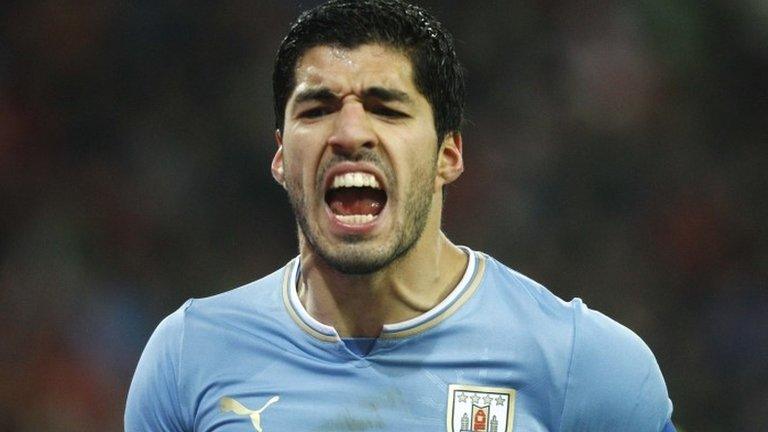
- Published23 May 2014
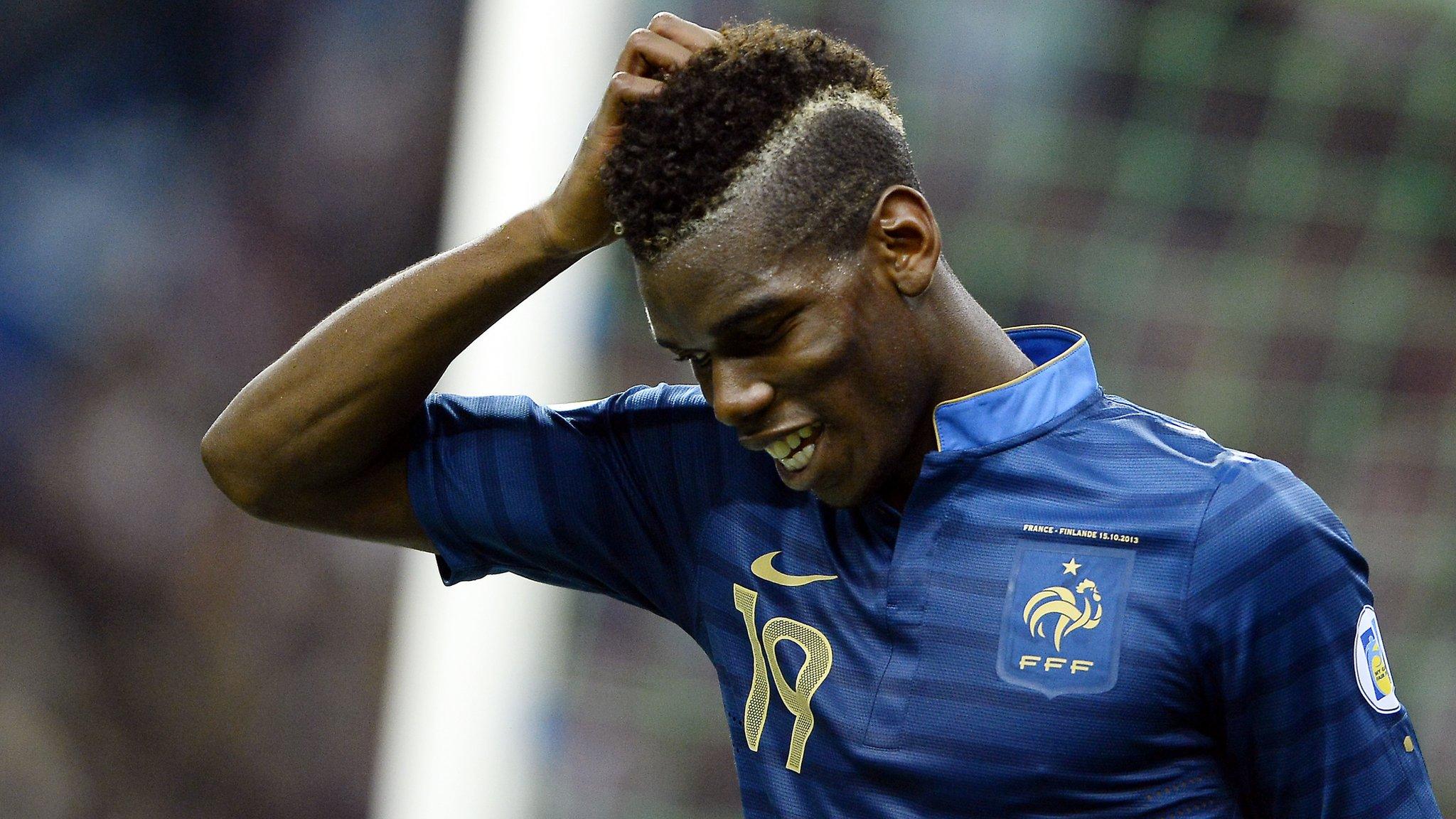
- Published23 May 2014
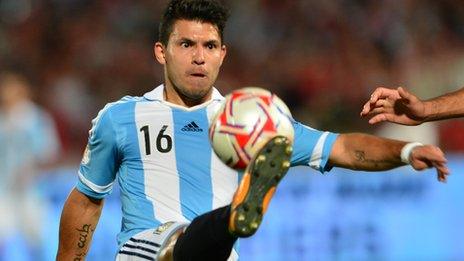
- Published7 June 2014
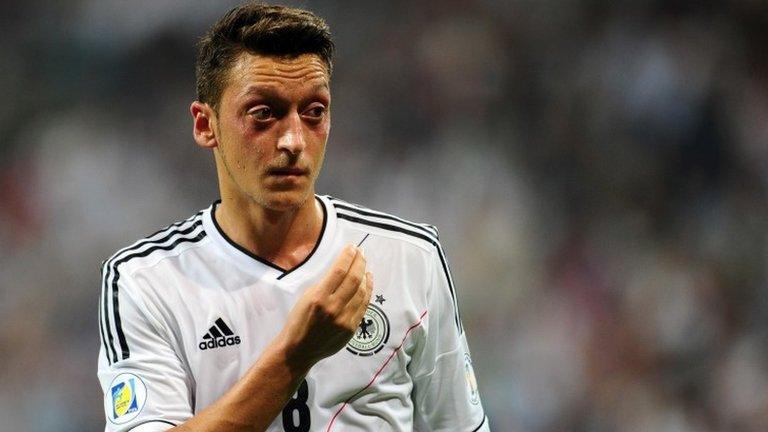
- Published23 May 2014
